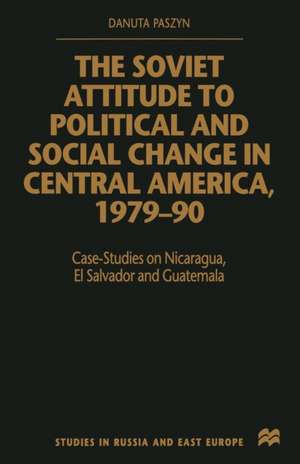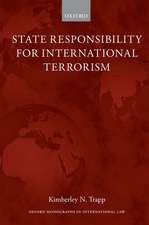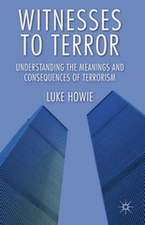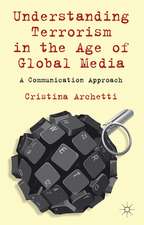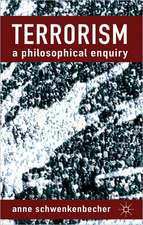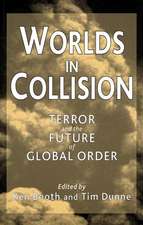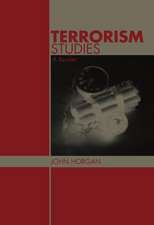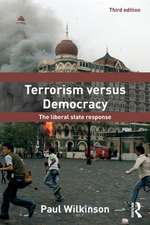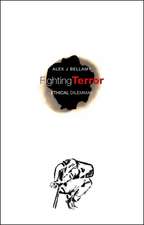The Soviet Attitude to Political and Social Change in Central America, 1979–90: Case-Studies on Nicaragua, El Salvador and Guatemala: Studies in Russia and East Europe
Autor D. Paszynen Limba Engleză Paperback – 7 apr 2000
Din seria Studies in Russia and East Europe
- 8%
 Preț: 588.14 lei
Preț: 588.14 lei - 15%
 Preț: 642.03 lei
Preț: 642.03 lei - 15%
 Preț: 647.92 lei
Preț: 647.92 lei - 18%
 Preț: 951.77 lei
Preț: 951.77 lei - 15%
 Preț: 643.65 lei
Preț: 643.65 lei -
 Preț: 384.48 lei
Preț: 384.48 lei - 15%
 Preț: 641.71 lei
Preț: 641.71 lei - 15%
 Preț: 643.99 lei
Preț: 643.99 lei - 15%
 Preț: 641.20 lei
Preț: 641.20 lei -
 Preț: 394.51 lei
Preț: 394.51 lei - 15%
 Preț: 642.18 lei
Preț: 642.18 lei - 18%
 Preț: 887.05 lei
Preț: 887.05 lei - 18%
 Preț: 949.42 lei
Preț: 949.42 lei - 18%
 Preț: 727.66 lei
Preț: 727.66 lei - 18%
 Preț: 1222.17 lei
Preț: 1222.17 lei - 15%
 Preț: 644.30 lei
Preț: 644.30 lei - 18%
 Preț: 944.99 lei
Preț: 944.99 lei -
 Preț: 389.31 lei
Preț: 389.31 lei - 18%
 Preț: 948.79 lei
Preț: 948.79 lei -
 Preț: 389.88 lei
Preț: 389.88 lei - 15%
 Preț: 646.11 lei
Preț: 646.11 lei - 15%
 Preț: 638.72 lei
Preț: 638.72 lei -
 Preț: 383.71 lei
Preț: 383.71 lei - 15%
 Preț: 643.99 lei
Preț: 643.99 lei - 15%
 Preț: 640.55 lei
Preț: 640.55 lei - 15%
 Preț: 638.76 lei
Preț: 638.76 lei -
 Preț: 388.52 lei
Preț: 388.52 lei -
 Preț: 188.83 lei
Preț: 188.83 lei - 15%
 Preț: 644.30 lei
Preț: 644.30 lei -
 Preț: 383.12 lei
Preț: 383.12 lei -
 Preț: 394.51 lei
Preț: 394.51 lei - 15%
 Preț: 643.00 lei
Preț: 643.00 lei
Preț: 379.09 lei
Nou
Puncte Express: 569
Preț estimativ în valută:
72.54€ • 75.74$ • 59.90£
72.54€ • 75.74$ • 59.90£
Carte tipărită la comandă
Livrare economică 15-29 aprilie
Preluare comenzi: 021 569.72.76
Specificații
ISBN-13: 9781349414888
ISBN-10: 1349414883
Pagini: 170
Ilustrații: IX, 161 p.
Dimensiuni: 140 x 216 x 9 mm
Greutate: 0.2 kg
Ediția:1st ed. 2000
Editura: Palgrave Macmillan UK
Colecția Palgrave Macmillan
Seria Studies in Russia and East Europe
Locul publicării:London, United Kingdom
ISBN-10: 1349414883
Pagini: 170
Ilustrații: IX, 161 p.
Dimensiuni: 140 x 216 x 9 mm
Greutate: 0.2 kg
Ediția:1st ed. 2000
Editura: Palgrave Macmillan UK
Colecția Palgrave Macmillan
Seria Studies in Russia and East Europe
Locul publicării:London, United Kingdom
Cuprins
Preface Acknowledgements Introduction Soviet Interest and Communist Tactics in Central America Prior to the Sandinista Victory of 1979 The Soviet Reaction to the Opportunities Created by the Nicaraguan Revolution The Extent of Soviet Military and Economic Assistance to the Sandinista Regime Leftist Regime Prior to Gorbachev Assuming Office The Impact of Gorbachev's Policy of Perestroika and 'New Thinking' on Soviet-Nicaraguan Relations The Soviet Attitude to the Struggle of the Farabundo Marti National Liberation Front (FMLN) in El Salvador The Soviet Posture vis-a-vis the Guatemalan Revolutionary Process Conclusion Notes Bibliography Index
Recenzii
'The Soviet role in Central America was one of the most controversial aspects of international relations in the 1980s. Seen by Washington as the spearhead of a move onto the mainland of Latin America, and by local radicals as a potential source of military and economic support, the Soviet Union was in reality more pragmatic and cautious than either realised. Basing herself on a wide range of Russian and Western materials, and with the clarity of hindsight, Danuta Paszyn has made an original and valuable contribution to our understanding of this closing phase of the Cold War.' - Professor F. Halliday, London School of Economics and Political Science
'...provides useful background to the changing Soviet policies and attitudes towards radical social change in Central America...' - International History Review
'...this study provides an interesting examination of the Soviet role vis-à-vis the Nicaraguan revolution, which challenges the basic rationale that sustained the US government's counterrevolutionary involvement in Central America. I would recommend this book for courses on US-Latin American relations and the politics of revolution in Latin America.' - Ariel C. Armony, Colby College, Latin American Studies
'...provides useful background to the changing Soviet policies and attitudes towards radical social change in Central America...' - International History Review
'...this study provides an interesting examination of the Soviet role vis-à-vis the Nicaraguan revolution, which challenges the basic rationale that sustained the US government's counterrevolutionary involvement in Central America. I would recommend this book for courses on US-Latin American relations and the politics of revolution in Latin America.' - Ariel C. Armony, Colby College, Latin American Studies
Notă biografică
DANUTA PASZYN is a researcher. She holds an M.Sc. in geography and a M.Phil. in international relations.
